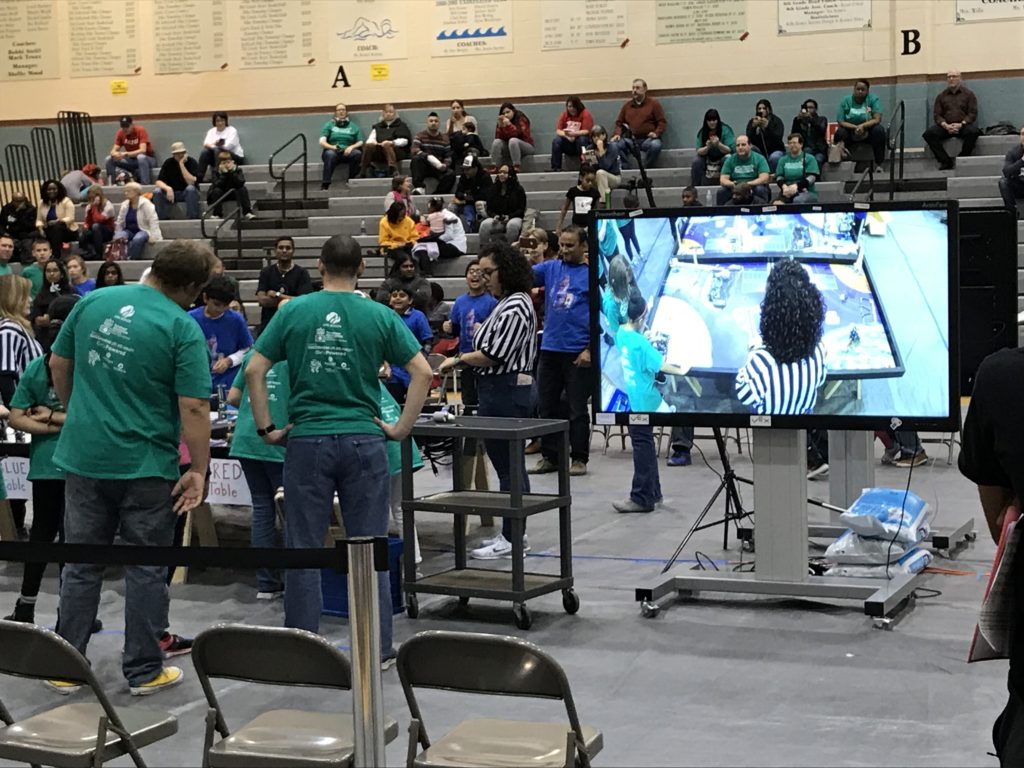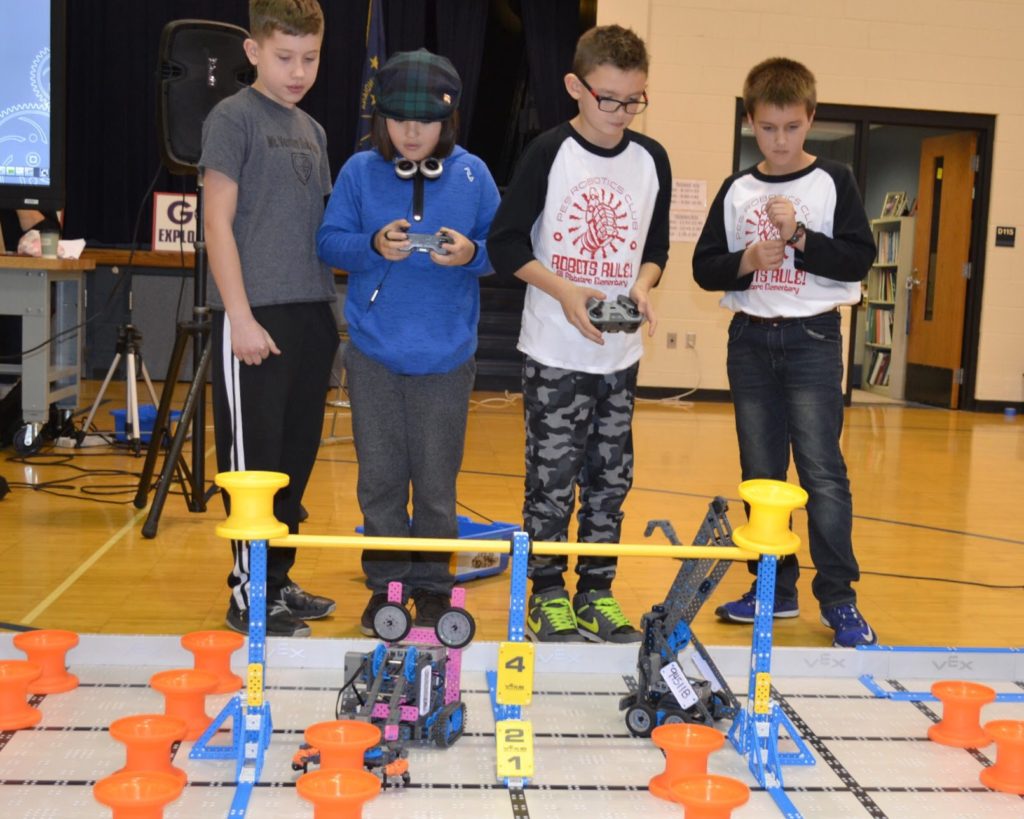Kids learn more by doing than by watching. Teachers understand this, unfortunately some parents don’t. We’ve all heard about the helicopter and now snowplow parents- unfortunately I have seen it so many times in the world of robotics. I try to write it off as an adult who wishes that they could have done this during school – but sometimes it’s the “my child must win” mentality instead. “My child cannot experience adversity, even though it might make them a better person.” As an experienced educator I can look at a project and see a child’s work in it. It won’t be perfect. It will be fairly simple in design. My district’s Robotics League has proven this to me. I’m guessing that a lot of the coaches were probably “voluntold.” They are almost as excited as the kids. Over the course of one scrimmage and four rounds you can see how the teams are learning and most of all trying out even (what an adult would consider) the craziest ideas. Their enthusiasm shows in their designs.
You can look at a another robot and see adult meddling. Sadly, these are the kids who also get frustrated in my classroom when they aren’t given the answer. The ones who ask for help before they even look at the directions. These are kids who will either give up on anything mildly challenging or whose parents would spend hundreds of thousands of dollars to get them into a “good” college if they could. Unfortunately, these also tend to be the bots that win. It’s funny when you have one team dominating a competition, but off to the side one of my students is explaining to them how to program… wait a second he was explaining basic programming to the team that was on the top of the programming skills list, could an adult have helped them? I recall the same school at another competition asking me to help them with a glitch – two adults asked me about programming. They probably thought I was just being unhelpful when I pointed them to one of our youngest team members – she was our expert programmer. I don’t think she could have helped, they were asking about programming something, no elementary school kid could have even imagined. The terms used in competition are: Mentorbots or “Dadbots” While I’m sure some of the ideas came from kids, the fingerprints of adults are all over the robot.
The role of the teacher is to create the conditions for invention rather than provide ready-made knowledge. – Seymour Papert
My robotics meetings do not involve many adults. While it would be nice to have mentors, even older students just want to give the answers away, instead of have the students earn them through hard work. I just checked the latest game update for VEX and they had to define that copying & pasting a line of code created by a parent/mentor is wrong… really?!? I’ve purposely strayed away from having adults help out except for herding cats during tournaments, because it is so easy to slip, you want your kid to be successful- but true success comes from failing and trying again. Failing can hurt.
Let’s take a moment and look at Robotics at school – there are many options and flavors to choose from. To simplify I’m sticking to the two 800 pound gorillas – FIRST & VEX. At each level of learning there are robot options. Using my district as an example in the elementary we have FIRST LEGO League, and VEX IQ.
FIRST uses LEGO robots, WeDo, Mindstorms, or now SPIKE Prime, mattering if you are in Jr. FLL or FLL. There is no easy grant available so you need to find funding for a robot and registration which includes the field mat & game elements. Total initial cost is around $800 this does not include the materials to build a table to put your mat on. annual costs are registration & tournament fees.
This being Indiana, VEX IQ, due to grants, is the major player. You see a school can apply for a grant to create a team and get a robot kit ($350) and their first season registration fee ($100) paid. All they have to do is attend an orientation meeting and compete in one tournament. After one tournament, when you see the impact, win or lose you are pretty much hooked. The only outside cost would be a practice field & game pieces. Around $300, but only the game pieces – $100 need to be purchased each year.
FLL teams consist of up to six students in grades 4-6. FLL itself consists of four parts: Research Project, Robot Design, Robot Game, and Core Values. So as a coach you help guide your team through researching a project, designing and building a robot, programming that robot, and presenting the project and the experience with the core values. You have a limited time window to accomplish this. Each year the theme changes and the official details are not released until the start of the school year. Using Indiana as the only experience I have had, it can be rather daunting. You apply to compete in a state qualifier that is usually one of two weekends in November. During the day long competition, teams present their project, the core values, their robot design process and then demonstrate their robot performance in the game. These robots are autonomous (programmed) and they have 2 minutes to get as many points by completing as many missions on the board as possible. The awards are given and a few teams move on. Everyone else goes home to take apart their bot and move on.

Elementary VEX IQ teams consist of as many students as you would like between first and fifth grade. The actual rule now deals with age, but to simplify we’ll go by grades. VEX consists of a number of parts: the Teamwork Challenge, Design Notebook, Driver Skills, Programming Skills, and a Research Project. The crazy part is only the teamwork challenge is “mandatory” and that’s the part the kids want to do anyway. The challenge is released at the end of the school year so teams have the entire summer to try out options although many teams don’t get started until the start of school. During the day long competition, teams compete together with other schools to get the highest score possible. Each match has two robots on the field two drivers for each robot working together for one minute. Each team gets upwards of 8 matches paired with different teams. During the day if you turned in a design notebook you would be interviewed. If you programmed your robot you could have it run on the skills field, if you had prepared to drive a robot solo you could go make a drivers skills attempt. At the end the top 10 teams from the matches are paired by average score to compete in the finals and the team with the highest score in that match wins. Awards are given in every category & if warranted an excellence award is given to the deserving team. The winners of the excellence award & teamwork awards (three teams) are given invitations to the State championship. Everyone goes home & rebuilds their robots to make them better and comes back to another tournament to try again and again, and again, and again until the season is over.

As you can see both competitions change annually, but the robot and field/table can be reused. So to start, both programs seem pretty similar – a robot on a field doing stuff to get points. The team with the most points win. Initial cost to play (without grants) is somewhat comparable although FLL is more.
—
Both competitions give adults lots of room to mess around even though they shouldn’t. As an adult/coach/mentor/teacher I take my notes, I go over data with my teams. I answer direct questions, usually with other questions. I get them to think. My students are brilliant, frankly all kids are if given the chance in the right situation. Too many times it is us, the adults, who have trained them to give up when the answer isn’t easy. The student who asks the same question over and over again because at some point they annoyed an adult enough to break down and provide the answer. They give up easily and ask for “help”. When you start talking to these kids, asking what they’ve tried, you discover that frustrated adults somewhere turned “help” into just doing it for them and that’s what they want. I walk away and they get mad, but sometime later they return exploding with excitement because they could do it. Let them play. I know it’s hard, because we didn’t have this kind of stuff growing up, and it is so awesome you want to play yourself. I didn’t say you couldn’t but don’t take away from the kids learning. If it’s robotics or anything – Just let the kids play, let them discover – the world will be a better place without our meddling.

